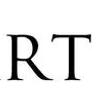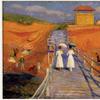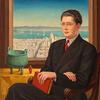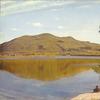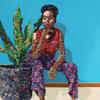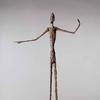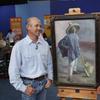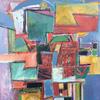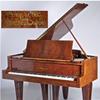The Color of the Moon: Lunar Painting in American Art
- YONKERS, New York
- /
- September 01, 2018
The moon—its face, color, and enduring myth—threads through the tapestry of American landscape painting, holding timeless allure for artists everywhere. This softly glowing orb has inspired countless works of art since the first humans looked up at the skies and saw its cratered face. The experience of contemplating the moon is universal to the human experience. It unites us in philosophical questions about our own place in the world.
On view now through May 12, the Hudson River Museum, in Yonkers, New York, presents a stunning exhibition devoted to the allure of the moon for American painters, whose art has reflected the eternal fascination with our closest celestial body. It is the first major museum examination of the moon as it relates to the story of the American nocturne, as it developed from the early 1820s through the late 1960s.
The exhibition features more than 50 works of art, highlighting key painters who depicted the moon, from the early 19th-century masterpieces of Thomas Cole, the father of the Hudson River School, who embraced a kind of longing Romanticism that the astronomical body symbolized, to late works by famed illustrator Norman Rockwell, represented by his depictions of a long-held romantic yearning finally fulfilled–America’s triumphant lunar landing in 1969. All of the works in the exhibition underscore how the Romantic idea of the moon held an inexorable pull for artists, and was central to its depiction of landscape, a subject of ongoing engagement at the Museum.
The Color of the Moon premiered at the Hudson River Museum and runs through May 12, followed by a summer 2019 showing at the James A. Michener Art Museum in Doylestown, Pennsylvania, which has partnered with the Hudson River Museum to organize the exhibition. The Color of the Moon reveals the long and enduring relationship between art and lunar science.The exhibition coincides with the 50th anniversary of the Apollo 11 mission, when American astronauts traveled across the skies to step onto the pitted surface of the moon in July 1969. Even before that historic moment, much scientific and aesthetic debate revolved around the question: What color is the moon? Artists continued their own explorations despite public disappointment when astronauts reported the rocks and dust were grayish brown. The Hudson River Museum, which has the only public planetarium in Westchester County and is dedicated to exploring the relationship between the arts and science, is poised as an ideal venue to explore this subject.
Several works from the Museum’s collection will be featured in The Color of the Moon, including The Burning Shipby Albert Bierstadt. Other major artists represented through loans include Jasper Francis Cropsey, Frederic Church, Albert Bierstadt, Susie M. Barstow, George Inness, Edward Bannister, Ralph Blakelock, Winslow Homer, Childe Hassam, Arthur Dove, Edward Steichen, Oscar Bluemner, Marguerite Zorach, Joseph Cornell, and Jamie Wyeth.
Major lenders include the National Gallery of Art, Smithsonian American Art Museum, The New-York Historical Society, Cooper Hewitt, Smithsonian Design Museum, Yale University Art Gallery, Olana State Historic Site, Pennsylvania Academy of the Fine Arts, the Delaware Art Museum, the Virginia Museum of Fine Arts, and Francis Lehman Loeb Art Center at Vassar College, along with works from private collections.
Publication:
The Hudson River Museum will co-publish a fully-illustrated, 200-page catalog with Fordham University Pressand the Michener Art Museum. Authors include co-curators Laura Vookles (Chair, Curatorial Department, Hudson River Museum) and Bartholomew F. Bland (Executive Director, Lehman College Art Gallery, The City University of New York), as well as Theodore W. Barrow (Assistant Curator, Hudson River Museum), Stella Paul (author of Chromaphilia: The Story of Color in Art), and Melissa Martens Yaverbaum (Executive Director, Council of American Jewish Museums). Themes explored in the essays will include our eternal fascination with the appearance of the moon and the myths it inspired; the moonlit landscapes of the Hudson River School; the moody moon of the Gilded Age; the allure of our lunar neighbor for early Modernists; and how the race for the moon transformed its appearance in popular culture.


